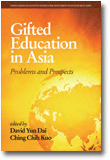
Gifted Education in Asia
Problems and Prospects
Edited by:
David Yun Dai, SUNY– Albany
Ching Chih Kuo, National Taiwan Normal University
A volume in the series: Chinese American Educational Research and Development Association Book Series. Editor(s): Guofang Wan, Loyola University Chicago.
Published 2015
The book “Gifted Education in Asia: Problems and Prospects” is the first of its kind in terms of providing a critical assessment of the state of gifted education in nine representative countries or regions in Asia (Hong Kong, India, Japan, Mainland China, Saudi Arabia, Singapore, South Korea, Taiwan, and Turkey), five commentaries that put gifted education in a global context, and a conclusion chapter that provides a long‐term projection of future developments in gifted education in an information age and knowledge economy in the 21st century, and what challenges and opportunities lie ahead for Asian countries. As Asia has become an economic powerhouse globally, and its education has also gained global attention (e.g., its stellar performance in international comparisons such as PISA), gifted education gearing toward the cultivation of the most precious human capital gains added importance.
Authors of the 15‐Chapter volume come from Asia, Europe, and North America, and they represent top experts in the field of education. The book is an authoritative source of knowledge for anyone interested in gifted education, talent development, and creativity in this region. Policy makers, business and school leaders, teachers, educational researchers, and parents will find this book informative and thought‐provoking.
CONTENTS
Introduction: State of Gifted Education in Asia: The Need for a Critical Assessment, David Yun Dai and Ching Chih Kuo. PART I: CRITICAL ASSESSMENT OF GIFTED EDUCATION IN REPRESENTATIVE NATIONS AND REGIONS. The Long View of Gifted Education in Hong Kong, 1990–2015 and Beyond, Stephen D. Tommis. Gifted and Talented Education in Taiwan: A 40‐Year Journey, Wu‐Tien Wu and Yi‐Lung Kuo. Gifted Education in Mainland China: How It Serves a National Interest and Where It Falls Short, David Yun Dai, Saiying Steenbergen‐Hu, and Yang Yang. Gifted Education in Singapore, Maureen Neihart and Liang See Tan. Gifted Education in the Republic of Korea: Nurturing Creativity of the STEM Talented Students, Seokhee Cho and Jaeboon Lee. Virtual Gifted Education in Japan, Nobutaka Matsumura. A Critical Assessment of Gifted Education in India, Paromita Roy and Anitha Kurup. A Critical Assessment of the Education for Gifted and Talented Students in Turkey, Ugur Sak, Bahadır Ayas, Bilge Bal‐Sezerel, Ercan Öpengin, N. Nazlı, Özdemir, and Şule Demirel‐Gürbüz. Gifted Education in Saudi Arabia: A Review, Abdullah Aljughaiman, Mohammad Nofal, and Sascha Hein. PART II COMMENTARIES: GIFTED EDUCATION IN ASIA IN A GLOBAL CONTEXT Lessons in Gifted Education From Asia, Shane N. Phillipson and Sivanes Phillipson. Cultural Variations in Ideas of Gifts and Talents With Special Regard to the Eastern and Western Worlds, Joan Freeman. The Science and Education of the Individual: Gifted Education for All, Yong Zhao. Embracing Education for All Creatively: A Commentary on Gifted Education in East Asia, Ai‐Girl Tan. Gifted Education in Modern Asia: Analyses From a Systemic Perspective, Wilma Vialle and Albert Ziegler. PART III CONCLUSION Looking Back to the Future: Toward a New Era of Gifted Education, David Yun Dai.
-
Paperback978-1-68123-209-6
Web price: $45.04 (Reg. 52.99)
-
Hardcover978-1-68123-210-2
Web price: $80.74 (Reg. 94.99)
- eBook978-1-68123-211-9

- EDU000000 - EDUCATION: General
- EDU026060 - EDUCATION: Special Gifted
- EDU020000 - EDUCATION: Multicultural Education
-
 Advancing Methodologies to Support Both Summative and Formative Assessments
Advancing Methodologies to Support Both Summative and Formative Assessments
-
 Critical Issues in Early Childhood Teacher Education
Volume 2-International Perspectives
Critical Issues in Early Childhood Teacher Education
Volume 2-International Perspectives
-
 Critical Issues in Early Childhood Teacher Education
Volume 1 - US Perspectives
Critical Issues in Early Childhood Teacher Education
Volume 1 - US Perspectives
-
 Model Minority Myth Revisited
An Interdisciplinary Approach to Demystifying Asian American Educational Experiences
Model Minority Myth Revisited
An Interdisciplinary Approach to Demystifying Asian American Educational Experiences
-
 Rekindling Embers of the Soul
An Examination of Spirituality Issues Relating to Teacher Education
Rekindling Embers of the Soul
An Examination of Spirituality Issues Relating to Teacher Education
-
 Teaching and Learning Chinese
Issues and Perspectives
Teaching and Learning Chinese
Issues and Perspectives
-
 Teaching English Language Learners with Exceptionalities
A Collection of Research-Based Practices
Teaching English Language Learners with Exceptionalities
A Collection of Research-Based Practices

